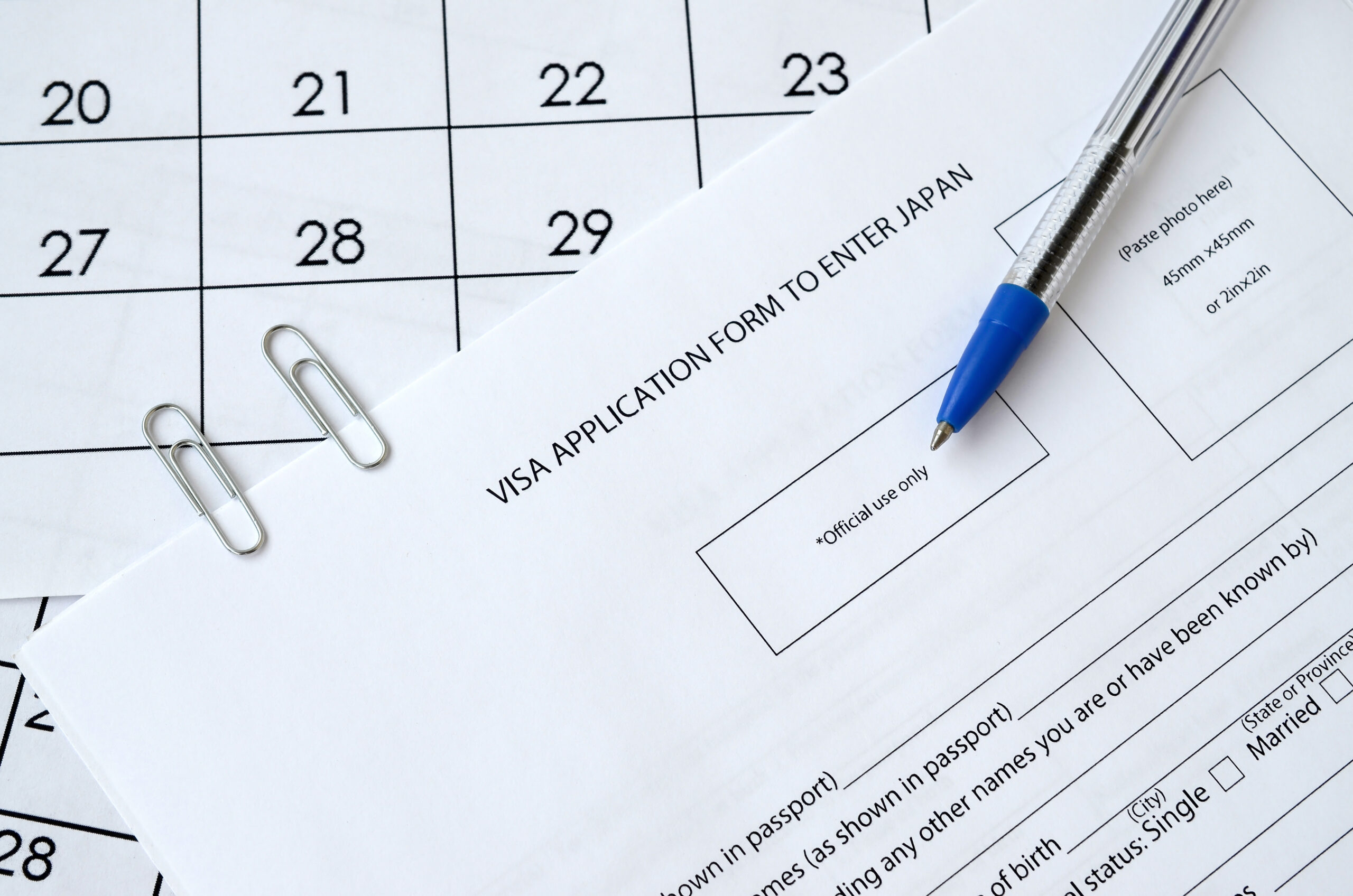Traveling to Japan, a nation rich in culture and history, can be an exciting adventure. However, before you can experience the cherry blossoms, temples, and vibrant cities, you need to navigate the visa application process. Understanding the various types of visas, the required documents, and potential pitfalls can streamline this often daunting task. This article offers essential tips to ensure a smooth visa application experience for your trip to Japan.
Understanding the Visa Types for Travel to Japan
When planning a trip to Japan, the first step is to determine the appropriate visa type for your journey. Japan offers several visa categories based on the purpose of travel, including tourist, business, work, student, and transit visas. Each category has different requirements and restrictions, so it’s essential to select the correct one that aligns with your travel plans.
For tourists, the short-term stay visa typically allows for stays of up to 90 days and is often the most sought-after option. Business visas may vary in duration and are generally issued for those traveling to Japan for meetings, conferences, or other professional engagements.
If you plan to study in Japan, you’ll need to apply for a student visa, which may require additional documentation such as proof of enrollment in a Japanese institution. Likewise, work visas are more complex and often require a job offer from a Japanese employer.
Understanding the specifics of each visa type not only helps streamline your application but also assists in gathering the necessary supporting documents. Consult the Japanese embassy or consulate in your country for the most accurate and current information regarding visa options.
Additionally, keep in mind that visa regulations can change, especially in response to global events such as pandemics. Checking for updates closer to your travel date can save you time and frustration.
Lastly, consider any potential future travel plans to Japan. For frequent travelers, a long-term visa or multiple-entry visa may be beneficial, as it allows for easier access without the need for repeated applications.
Essential Documents Required for Your Visa Application
A successful visa application hinges on the correct documentation. The essential documents vary depending on the type of visa, but some common requirements include a valid passport, completed visa application form, and recent passport-sized photographs.
Your passport should be valid for at least six months beyond your planned stay in Japan, and it should contain at least two blank pages for visa stamps. The visa application form can typically be downloaded from the embassy’s website and should be filled out accurately and in detail.
Recent photographs must adhere to specific size and quality standards; ensuring these meet the requirements is crucial. Inaccurate or unclear photographs can result in delays or denials.
For tourist visas, additional documents may include flight itineraries, hotel bookings, and proof of sufficient funds for your stay. Business visa applicants may need to provide an invitation letter from a Japanese company, along with any relevant documentation related to their employment.
Further documentation may be required for student and work visas, such as acceptance letters from educational institutions or employment contracts, respectively. Preparing these documents well in advance will help avoid last-minute scrambles.
Lastly, keep photocopies of all submitted documents for your records. This precaution ensures you have backups in case of lost paperwork or if the consulate requests additional information.
Step-by-Step Guide to Completing the Visa Form
Completing the visa application form can be one of the most critical steps in the process. Start by carefully reading the instructions associated with the form, as these guidelines will help you understand the information required.
Begin with your personal information, including your name, date of birth, nationality, and passport details. It’s vital to ensure that all information matches your passport exactly to prevent discrepancies that could delay processing.
Next, provide information regarding your travel plans, including your intended arrival and departure dates, places you plan to visit, and details about your accommodations. Being specific demonstrates planning and helps authorities understand the purpose of your visit.
Additionally, some visa forms require you to declare your employment status. If employed, include details about your employer along with your position and duration of employment. If you are a student, provide information about your school and course of study.
Once you’ve filled out the form, review it multiple times to catch any errors or omissions. A single mistake can lead to misunderstandings or longer processing times. Having someone else review your application can also be beneficial.
Finally, ensure that you sign and date the application before submission. Incomplete or unsigned forms are often rejected outright, causing unnecessary delays in the visa issuance process.
Common Mistakes to Avoid When Applying for a Visa
Navigating the visa application process can be tricky, and understanding common pitfalls can help prevent delays or denials. One of the most frequent mistakes is submitting incomplete applications. Ensure that every section of the application form is filled out, even if some sections do not apply to you.
Another common error is providing inaccurate information. Double-check all entries for accuracy, as discrepancies between your application and supporting documents can raise red flags for consulate officials.
Missing or incorrect supporting documents can also hinder your application. Ensure that you have gathered all necessary documents beforehand, and verify that they meet the consulate’s requirements.
Additionally, applicants often overlook the importance of providing a detailed travel itinerary. A vague plan may lead to questions about your purpose in Japan, so be as specific as possible when outlining your travel plans.
Moreover, failing to follow the submission guidelines can result in delays. Each consulate may have unique requirements for document format, delivery method, and appointment scheduling. Familiarize yourself with your specific consulate’s rules to avoid errors.
Lastly, be proactive in your approach. Waiting until the last minute to submit your application can lead to unnecessary stress and may result in rushed submissions, which are more prone to errors. Start the process early to allow ample time for corrections and adjustments.
How to Prepare for Your Visa Application Interview
Some visa applicants may be required to attend an in-person interview as part of the application process. Preparing for this interview is essential, as it can significantly influence the outcome of your visa application.
Begin by reviewing your visa application and all supporting documents to ensure you are familiar with the information you provided. Being able to discuss your travel plans and intentions in detail is crucial, as the interviewer may ask probing questions.
Rehearse common interview questions, such as those regarding your purpose of travel, itinerary, and how you plan to finance your trip. Practicing your answers can help you articulate your thoughts clearly during the interview.
Dress appropriately for the interview; first impressions matter. Business casual attire typically works well, demonstrating that you take the process seriously.
Arrive at the interview location early to allow time for unforeseen circumstances, such as traffic or delays. This punctuality reflects your respect for the process and can set a positive tone for the interview.
Finally, approach the interview with confidence. Answer questions honestly and succinctly, and don’t be afraid to ask for clarification if you don’t understand a question. A calm demeanor can go a long way in setting a positive atmosphere.
The Importance of Accurate Financial Documentation
One of the critical components of your visa application is demonstrating that you have the financial means to support your stay in Japan. Inaccurate or insufficient financial documentation can lead to visa denials, making it essential to present clear and compelling evidence of your financial stability.
Begin by organizing your financial records, including bank statements, pay stubs, employment letters, and tax returns. These documents should reflect a consistent income that aligns with your planned expenditures in Japan.
Ensure that your bank statements cover a significant period leading up to your application. Most consulates prefer at least the last three months of statements to verify your financial history. Highlight any substantial deposits or transactions that might raise questions.
If you plan to be sponsored by a family member or friend, include a sponsorship letter along with their financial documentation. This letter should clearly state their willingness to support your stay, as well as their relationship to you.
Additionally, avoid providing cash or personal financial information that could be sensitive. Instead, focus on presenting documented evidence that is easily verifiable by consulate officials.
Finally, be prepared to answer questions regarding your finances during your interview. Having a clear understanding of your financial situation will enable you to respond confidently and provide further documentation if requested.
Tips for Gathering Supporting Documents Efficiently
Collecting the necessary supporting documents for your visa application can seem overwhelming. However, with a systematic approach, you can make the process more efficient. Start by creating a checklist of all required documents based on your visa type to ensure nothing is overlooked.
Next, prioritize the documents that may take longer to obtain, such as bank statements or employment verification letters. Request these items early to allow for any processing delays.
Utilize online resources to gather necessary forms more quickly. Many embassies provide downloadable visa application forms, which can save time compared to in-person visits.
When collecting photos for your application, consider visiting a professional photography service that specializes in passport photos. They are familiar with the specific requirements and can ensure your photos meet all necessary standards.
Keep your documents organized in a folder, categorized by type: personal identification, financial documents, and travel information. This organization will facilitate easy access during your application process and help you avoid confusion.
Finally, consider using cloud storage to maintain digital copies of your documents. In the event of a loss, having backups readily available can save you a great deal of stress and complications.
Navigating the Visa Application Process Timeline
Understanding the visa application process timeline is crucial for planning your trip effectively. Start by familiarizing yourself with the average processing times for the specific visa category you are applying for, as these can vary significantly depending on the type of visa and the consulate.
Typically, short-term tourist visas may take between 5 and 10 business days for processing, while student or work visas may require more time, sometimes extending to several weeks or even months. Check with your local consulate for the most accurate estimates.
Begin your application as early as possible to buffer against unforeseen delays. Starting the process several months in advance allows you to gather documents, address any issues, and accommodate any personal or unforeseen events that may arise.
Keep in mind that external factors can influence processing times, such as holidays, staffing changes, or natural disasters. It’s wise to stay informed about any potential disruptions that could impact your application timeline.
Furthermore, consider potential waiting times for interviews if required. Some consulates may have high demand for interview slots, leading to longer wait times. Scheduling your appointment as early as possible is key.
Lastly, inquire about expedited processing options if you have an urgent need to travel. Some consulates may offer this service for an additional fee, allowing you to bypass the standard waiting period.
What to Expect After Submitting Your Application
Once you have submitted your visa application, it’s natural to feel anxious about the outcome. Generally, you can expect to receive an acknowledgment of your application, often in the form of a receipt or confirmation email from the consulate. This confirmation is essential as it usually provides a unique application number for tracking purposes.
Processing times can vary based on your visa type and the specific consulate, so it’s essential to manage your expectations. If you submitted your application during a peak travel season, processing may take longer due to increased demand.
During this waiting period, avoid making non-refundable travel plans until your visa is approved. It’s wise to wait for official confirmation before booking flights and accommodations to prevent potential financial loss.
If your visa application requires additional documentation or clarification, the consulate may reach out to you. Be prepared to respond promptly and provide any requested information to avoid unnecessary delays.
Once your application has been processed, you will receive notification about whether your visa has been approved or denied. If approved, your visa will be affixed to your passport, and if denied, you will usually receive an explanation for the decision.
Finally, take the opportunity to review the visa carefully upon receipt to ensure all details are correct. Any discrepancies should be addressed immediately with the consulate for rectification.
How to Handle Visa Denials and Appeals
Facing a visa denial can be disheartening, but it’s vital to approach the situation with a clear plan. Start by carefully reviewing the denial letter to understand the specific reasons provided by the consulate. Common reasons for denial include insufficient documentation, lack of financial proof, or failure to demonstrate ties to your home country.
If you believe that you can address the issues raised in the denial, consider reapplying with the necessary documentation. This often involves gathering additional evidence to support your application and addressing any concerns highlighted in the denial.
Alternatively, you may have the option to appeal the decision. Each consulate will have specific procedures for appeals, typically outlined in the denial letter. Follow these instructions carefully, as failing to adhere to the process can lead to further complications.
In some cases, seeking advice from an immigration lawyer or a visa consultant can provide additional insights and guidance. They can help you to craft a stronger application or appeal based on their experience with similar cases.
Regardless of your approach, maintain a professional and courteous demeanor in all communications with the consulate. Rude or confrontational behavior can hinder your case and damage your chances of future applications.
Finally, learn from the experience. Use the denial as an opportunity to improve your application skills and better prepare for future submissions. Understanding the process more thoroughly will increase your chances of success next time.
Understanding Visa Fees and Payment Methods
Visa fees are an essential aspect of the application process that every applicant should understand. The cost of a visa can vary based on the type of visa, as well as the applicant’s nationality and the consulate’s policies. Generally, tourist visas are among the least expensive, while work or student visas may incur higher fees.
When applying, it’s crucial to check the latest fee schedule from the embassy or consulate’s website. Fees are typically paid in the local currency and may be subject to change, so obtaining up-to-date information is essential.
Payment methods also vary by consulate. Some accept cash, while others may require payment via credit card or bank transfer. Familiarizing yourself with these requirements beforehand can help you avoid complications during the application process.
Additionally, keep in mind that visa fees are generally non-refundable, even in cases of application denial. Therefore, it’s vital to ensure that your application is complete and accurate to minimize the likelihood of denial and the associated costs.
Some embassies may offer expedited service for an additional fee, which can be a worthwhile investment if you are under time constraints. If possible, weigh the benefits of expedited processing against your financial situation.
Finally, maintain records of all payments made during the visa application process. This documentation can be useful in the event of discrepancies or if you need to address any issues with your application later.
Staying Informed: Tracking Your Visa Application Status
After submitting your visa application, staying informed about its status can help alleviate anxiety. Many consulates provide online tracking systems, allowing applicants to monitor the progress of their applications using a unique reference number.
To track your application, visit the consulate’s official website and look for the visa application status section. Enter the required information, which often includes your application number and personal details, to obtain updates.
If online tracking is not available, consider calling the consulate directly for status inquiries. Be prepared to provide your identification and application details, and remember that consulate staff may have limited information while processing is ongoing.
Timing is essential when checking your application status. Inquire about your application only after a reasonable processing timeframe has elapsed, as frequent calls or inquiries can be seen as intrusive and may not yield additional information.
If your application has been pending for an unusually long time, it may be worth reaching out to inquire about the delay. Be polite and understanding, as the consulate is likely handling many applications at once.
Finally, practice patience. Visa processing times can fluctuate based on various factors, including seasonal demand and changes in regulations. Staying informed while remaining patient will help you navigate this phase of the application process more smoothly.
Applying for a visa to Japan does not have to be a daunting task. By understanding the visa types, gathering the essential documents, and avoiding common pitfalls, you can streamline your application process. Being well-prepared for interviews and maintaining accurate financial records will further enhance your chances of success. Remember to keep track of your application status and be proactive in addressing any issues that may arise. With these essential tips, you are well on your way to experiencing the wonders of Japan. Safe travels!








